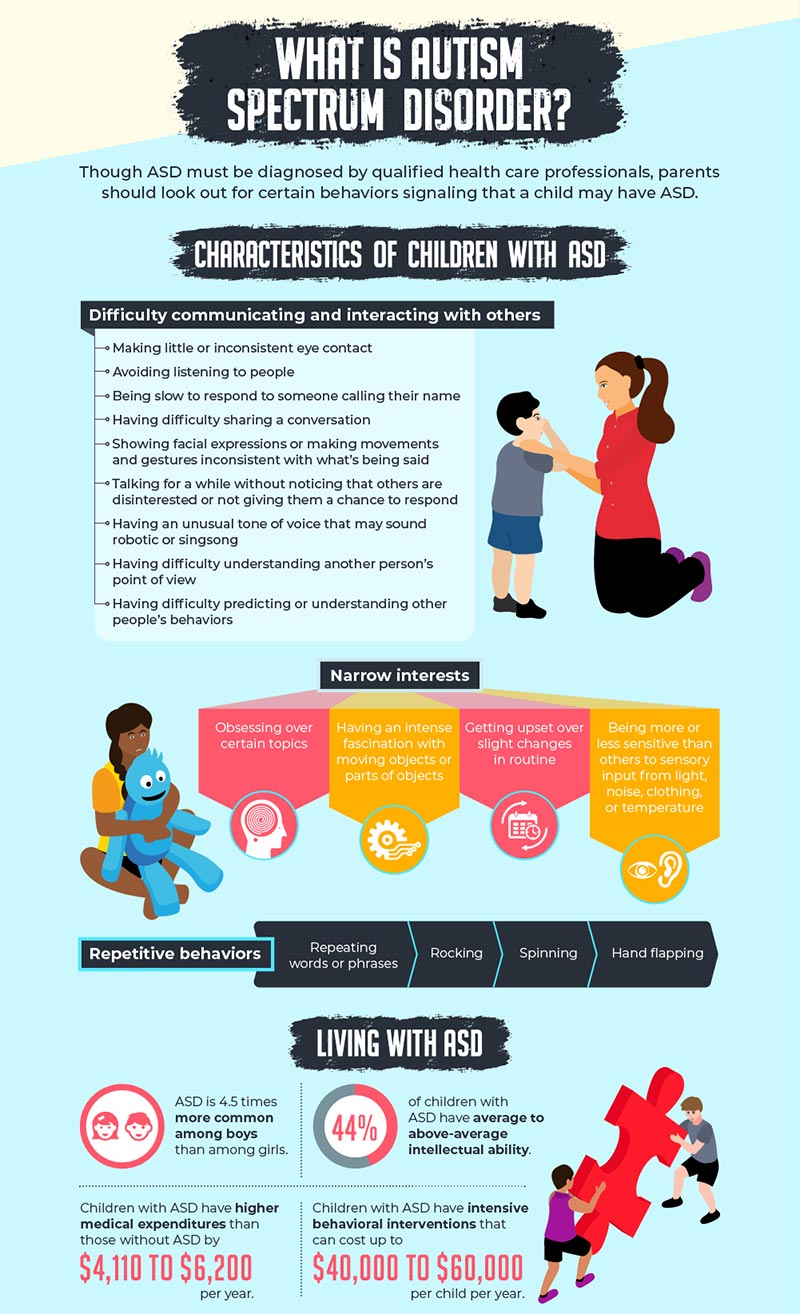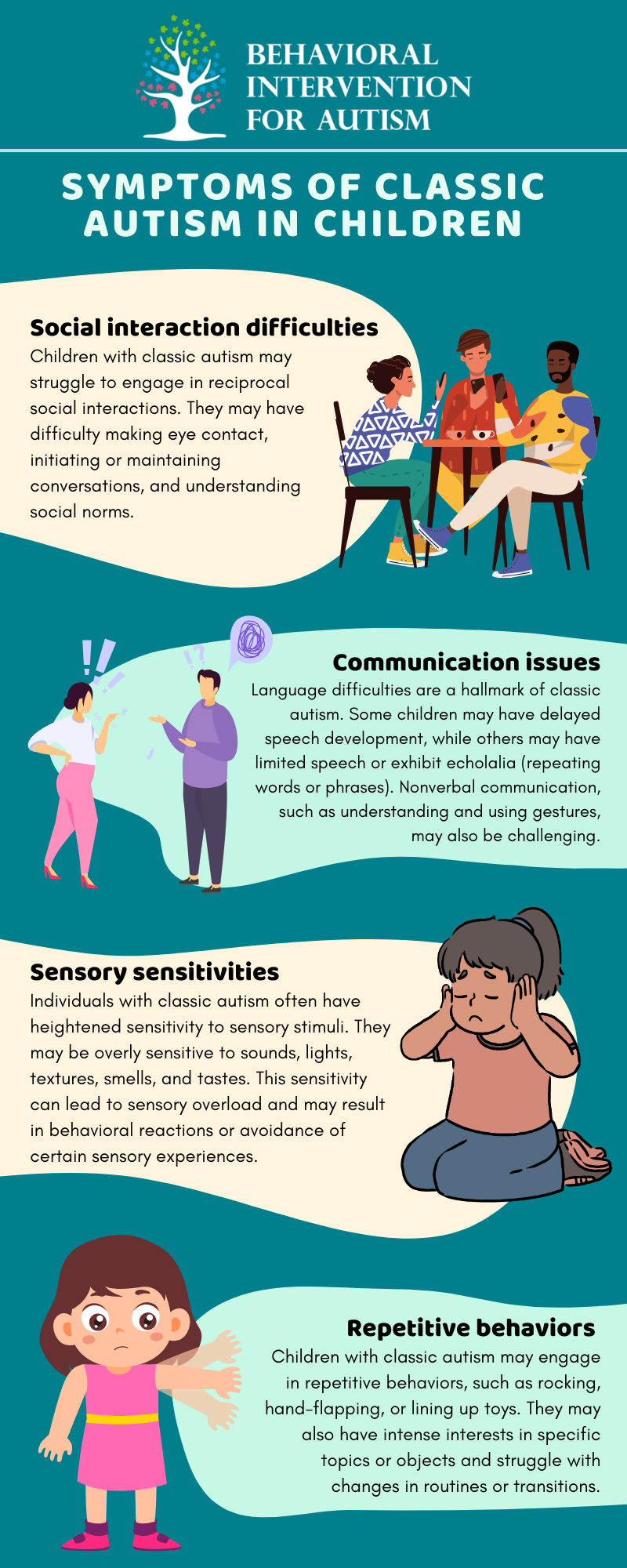Should you seek help from an Aba Therapist Near Me
Should you seek help from an Aba Therapist Near Me
Blog Article
Understanding the Effect of Behavioral Autism on Life and Social Communications
You may not realize just how deeply behavior autism impacts day-to-day live and social interactions. People on the range commonly browse a world loaded with communication difficulties and sensory overload. These difficulties can bring about frustration and isolation, influencing their relationships and total health. Recognizing these nuances is essential for promoting helpful environments. What methods can we apply to produce even more comprehensive areas and purposeful links? The solutions could shock you.
Defining Behavior Autism and Its Features
Behavioral autism, typically described as autism range problem (ASD), incorporates a range of conditions identified by obstacles in social interaction, interaction, and repetitive habits. You could observe that individuals with ASD often battle to analyze social signs, which can lead to misunderstandings in discussions. They might discover it hard to develop eye contact or take part in small talk, making social scenarios feel overwhelming.
Communication troubles can materialize in numerous means, from postponed speech growth to a preference for using fewer words. By recognizing these attributes, you can foster an atmosphere that promotes approval and motivates reliable interaction, aiding individuals with autism prosper in their day-to-day interactions.
The Spectrum of Autism: Recognizing Variability in Behavior
Autism spectrum condition (ASD) isn't a one-size-fits-all diagnosis; it differs widely amongst individuals. You may see that some individuals with ASD display moderate symptoms, while others may encounter more significant challenges. This variability can materialize in habits, interests, and sensory sensitivities. You might encounter individuals that are very spoken and engage easily in discussions, while others might favor singular tasks or communicate non-verbally.
Moreover, the means individuals with ASD react to sensory input can vary greatly; some may be overwhelmed by brilliant lights or loud noises, whereas others thrive in stimulating settings. The range additionally consists of distinctions in social interactions; some people may struggle to translate social hints, while others browse social settings with relative simplicity. Understanding this variability is crucial, as it aids you appreciate everyone's special experience and tailor support to their specific demands, cultivating a more comprehensive atmosphere for everybody.
Interaction Difficulties Encountered by People With Autism
When you communicate with individuals on the autism spectrum, you might notice their one-of-a-kind communication obstacles. They frequently deal with difficulties with both nonverbal and verbal cues, which can affect their social communications. Recognizing these barriers is important for promoting far better connections and assistance.

Verbal Interaction Problems
Lots of people on the autism spectrum experience verbal communication troubles that can significantly impact their everyday interactions. Your rate, tone, or volume might not align with social expectations, creating others to misinterpret your intents. Identifying these obstacles can help you and your support network create strategies to enhance interaction and cultivate much better connections with others in your everyday life.
Nonverbal Communication Barriers
Verbal communication isn't the only difficulty individuals on the autism range face; nonverbal interaction obstacles can be simply as significant. You might find it tough to interpret body movement, faces, and eye contact, which are essential for effective communication. These challenges can lead to misunderstandings or false impressions of social signs, making communications feel complex or overwhelming. You may struggle to express your own feelings through nonverbal ways, leaving others unclear of your feelings or intents. This separate can create feelings of seclusion and irritation. Acknowledging these obstacles is essential for cultivating understanding and compassion in your interactions. By dealing with nonverbal communication, you can discover methods to improve your social experiences and improve your total lifestyle.
Social Communication Impacts
Social interactions can commonly really feel overwhelming due to the unique communication challenges dealt with by people with autism. Recognizing these difficulties can aid you locate methods to improve interaction, such as practicing social abilities in secure setups or utilizing aesthetic help. Understanding your demands allows you to browse social communications with better confidence and convenience.
Social Communication and Partnership Building in Autism
While structure partnerships can be testing for individuals with autism, recognizing their unique perspectives and interaction styles can cultivate purposeful connections. You may see that numerous individuals on the range favor straight interaction and might battle with social signs or small talk. By being simple in your interactions, you can aid produce a setting where they feel comfortable.
Engaging in shared passions can additionally offer as a bridge to deeper connections. Whether it's a pastime, a preferred show, or a common enthusiasm, these usual threads can open up doors to friendship.
Day-to-day Live Routine: Navigating Techniques and difficulties
Maneuvering day-to-day life routines can be especially testing for individuals with autism, especially when unforeseen modifications take place. You could locate convenience in having a structured schedule, as it aids you expect what's next. It's typical to really feel anxious or overwhelmed when interruptions happen. To navigate these obstacles, think about executing visual timetables or checklists. These devices can supply quality and confidence.
Developing a regimen that consists of sensory breaks can likewise be beneficial. This assists develop an understanding setting.
Lastly, method mindfulness methods to handle anxiety and anxiety. Basic breathing exercises or basing strategies can make a substantial difference. By integrating these approaches, you can enhance your day-to-day routine and minimize disturbances, making life feel a lot more manageable.
Strengths and Capabilities of People on the Autism Spectrum
Comprehending day-to-day life routines is just one element of the autism experience. Many individuals on the autism range possess impressive staminas and abilities that establish them apart.
Moreover, your memory skills frequently shine, specifically in areas of interest. Autism Therapist. This propensity for retaining information can make you a beneficial resource in areas like modern technology, art, or science. You may likewise show solid visual thinking, enabling you to imagine complex principles and solve troubles artistically
Additionally, your distinct viewpoint on the world can foster empathy and understanding in others, improving social interactions. Embracing these toughness not just improves your confidence yet also helps others appreciate the diverse skills you offer the table.
Producing Inclusive Settings for People With Autism
Creating comprehensive environments for people with autism starts with designing sensory-friendly spaces that satisfy their one-of-a-kind requirements. You can additionally foster opportunities for social interaction, assisting to develop friendships and links. By making these changes, you'll add to an extra welcoming ambience for every person.
Designing Sensory-Friendly Spaces
While making sensory-friendly areas, it's vital to mirror on the one-of-a-kind requirements of people with autism. Integrate silent zones where people can charge and pull back when overwhelmed. Include visual schedules or clear signage to assist individuals navigate the room confidently.
Promoting Social Communication Opportunities
Creating sensory-friendly rooms not just addresses individual comfort yet also establishes the phase for purposeful social communications amongst individuals with autism. To promote these communications, produce comprehensive atmospheres that welcome participation. Organize structured activities, like art courses or team games, that urge collaboration without frustrating sensory input. Usage aesthetic help and clear interaction to help everyone engage comfortably. Encourage peer mentoring, combining individuals with autism with helpful peers who can assist them through social scenarios. Additionally, take into consideration hosting normal community events that commemorate neurodiversity, cultivating acceptance and understanding among all participants. By applying these strategies, you can enhance social possibilities, helping people with autism develop friendships and strengthen their social abilities in a secure, inviting environment.

Often Asked Concerns
Just How Can Friends Assistance Someone With Behavioral Autism?
You can sustain a friend with behavior autism by being individual, listening actively, and respecting their limits. Take part in tasks they enjoy, interact openly, and develop a comfortable atmosphere where they really feel valued and recognized.
What Resources Are Offered for Moms And Dads of Children With Autism?
You can check out numerous resources for moms and dads of kids with autism, including support system, educational internet sites, and local neighborhood services. Getting in touch with other parents can also supply valuable understandings and shared experiences to assist browse difficulties.
Can Behavioral Autism Modification With Time?

Yes, behavior autism can alter in time. You could observe changes in communication, social skills, and habits as your kid expands. Early treatment and assistance often play crucial roles in these developmental adjustments.
Exactly How Do Sensory Sensitivities Influence Daily Life?
Sensory level of sensitivities can make day-to-day experiences overwhelming. You might battle with intense lights or loud sounds, leading to anxiety or evasion. Finding atmospheres that fit your requirements can substantially enhance your convenience and overall life.
What Prevail Misconceptions Regarding Behavioral Autism?
You might believe behavioral autism only impacts communication skills, however it's more complex. Numerous assume individuals lack compassion or intelligence, which isn't true. Comprehending these misconceptions aids foster approval and assistance for those on the spectrum.
Behavioral autism, often referred to as autism spectrum problem (ASD), encompasses a variety of conditions characterized by obstacles in social communication, interaction, and repeated behaviors.Social interactions can often really get more info feel overwhelming due to the distinct communication challenges encountered by individuals with autism.Designing sensory-friendly areas not only addresses individual comfort yet additionally sets the stage for meaningful social interactions amongst people with autism. Urge peer mentoring, combining people with autism with helpful peers that can direct them through social situations. By implementing these strategies, you can enhance social chances, assisting individuals with autism build relationships and reinforce their social skills in a risk-free, inviting atmosphere.
Report this page